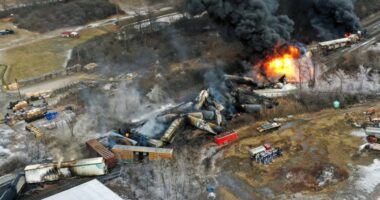Share this @internewscast.com
NEWS of another volcanic eruption in Iceland have stoked fears about travelling to the popular tourist destination.
Seismic activity has already begun, prompting a red alert to be issued for some areas in the country.


Is it safe to travel to Iceland?
Molten magma started flowing beneath Sunddhnúksgígar on April 2, before news broke that some lava had broken through the surface.
Iceland is located on the fault line between the Eurasian and North American tectonic plates, which makes it a seismic hotspot.
The country carefully monitors seismic activity as a result, in order to protect tourists and residents.
Travel to Iceland has continued, tough, despite the eruption.
Red alerts for the affected areas have been issued.
The government has issued advice on what you should do in the event of a volcanic eruption.
According to the Foreign, Commonwealth and Development Office’s advice, tourists should defer to the Icelandic government’s advice.
The Foreign Office said: “Volcanic eruptions and earthquakes are common in Iceland given the country’s natural geography.
“In the event of an eruption or wider seismic activity follow the latest advice issued by the authorities.”
What should you look for in a good travel insurance policy?
TRAVEL insurance policies can vary a great deal, making it hard to know whether a policy is good enough for your trip.
Here are the six essential areas that travel insurance policy should cover:
- Medical expenses – A good policy will give cover of £1million or more for travel in Europe and £2million or more for the USA
- Repatriation service – The costs of getting you back to the UK for medical reasons should be covered automatically by your policy
- Cancellation and curtailment – A good policy will cover you for £2,000 or more if you have to cancel or shorten your holiday
- Missed departure – Covers additional accommodation costs and travel expenses up to £500 or more if you miss your flight due to circumstances out of your control
- Delay – You’ll usually be covered for £250 or more if your travel plans are delayed due to circumstances out of your control
- Baggage cover – Covers you if your baggage is lost, damaged or stolen. Look for policies that have cover of £1,500 or more.
“The Government of Iceland keeps a close eye on any seismic and volcanic activity, with infrastructure designed to be robust. However, not all events can be foreseen, posing potential risks to travel plans, such as delays and cancellations due to rock falls and landslides, sudden flooding, and hazardous volcanic gases near eruption sites,” they mentioned.
Travelers are also advised to have insurance for their trip, covering canceled flights and accommodation or injuries.
How likely is a volcanic eruption?
According to the Icelandic Meteorological Office, the eruption at Sunddhnúksgígar has already begun.
A statement from the office, released shortly after the likelihood of an eruption became clear, read: “Warning: A magma eruption has begun.
“No magma has reached the surface as of now, but an eruption is likely to occur.”
Predicting an eruption, the Icelandic Meteorological Office stated: “The most likely outcome of this period of magma buildup is a magma intrusion and/or an eruption, expected to first occur in the area between Sundhnúkur and Stóra-Skógfell.”
Will my flights be cancelled?
Flights to Reykjavik are not expected to be disrupted by the eruption.
EasyJet have confirmed that they will continue to fly to Iceland, despite the eruption.
The airline said: “As Keflavik Airport is not affected by the eruption and is fully operational, there is currently no impact to our flying programme and we continue to monitor the situation.”
There is also a precedent for volcanic activity not causing flight cancellations, as the 2023 and 2024 eruptions did not affect air travel.
Although the 2010 eruption did ground flights and forced 20 countries to close their airspace, this was due to particular traits exclusive to that volcano.
The volcano was directly under the jet stream, which was unstable at the time, launching ash directly into the stream.
Since Sunddhnúksgígar is not beneath the jet stream, airlines do not have to worry about ash as they did in 2010.
Is Reykjavik safe from a volcanic eruption?
The volcano sits just 20 miles south-west of Reykjavik.
Although there is not an urgent threat to life in the Icelandic capital, the area surrounding the mountain is under a red alert.
It has not been confirmed how Reykjavik will be affected by the eruption, but the Icelandic capital is not expected to become unsafe.
Is the Blue Lagoon open?
Residents have been evacuated from Grindavík, which is home to the Blue Lagoon.
The entire area is under red alert, as it is so close to the eruption site.
The Blue Lagoon has been closed in order to keep residents and tourists safe.
Grindavík had been a dormant site for over 800 years before experiencing seismic activity once again in 2020.


Why is the crime rate in Iceland so low?
Iceland’s strong social cohesion – supported by its high tax system, which funds public spending – is the key to its low crime rate.
The country has an inexpensive education system with shockingly low university fees.
There are also very few murders in the country — from 0 to 1.5 per year — alongside high employment rates and a robust social safety net.
These factors mean that there are fewer reasons to commit crimes such as burglary.
Iceland also has strong protections which allow citizens to identify how they choose and to practise their own religions.
All of these factors make Iceland one of the safest countries in the world.
As the country can sometimes only see four to five hours of daylight, this low crime rate is crucial for making travellers feel safe.

















